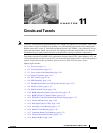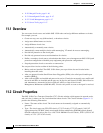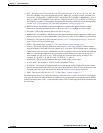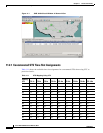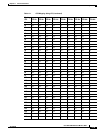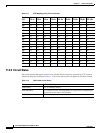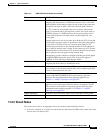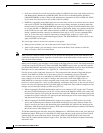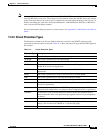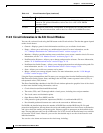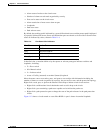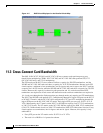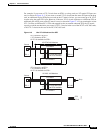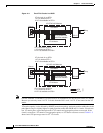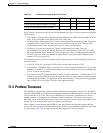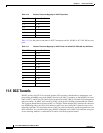
11-9
Cisco ONS 15454 Reference Manual, R8.5.x
78-18106-01
Chapter 11 Circuits and Tunnels
11.2.4 Circuit Protection Types
Note Although ML-Series cards do not use the Telcordia GR-1093-CORE state model, you can also set a soak
timer for ML-Series cards ports. The soak period is the amount of time that the ML-Series port remains
in the Down state after an error-free signal is continuously received before changing to the Up state. To
find the remaining port soak time, choose the Maintenance > Ether/POS Port Soak tabs in ML-Series
card view and click the Retrieve button.
For more information about port and cross-connect states, see Appendix B, “Administrative and Service
States.”
11.2.4 Circuit Protection Types
The Protection column in the Circuit window shows the card (line) and SONET topology (path)
protection used for the entire circuit path. Table 11-3 shows the protection type indicators that appear in
this column.
Table 11-3 Circuit Protection Types
Protection Type Description
1+1 The circuit is protected by a 1+1 protection group.
2F BLSR The circuit is protected by a two-fiber BLSR.
4F BLSR The circuit is protected by a four-fiber BLSR.
2F-PCA The circuit is routed on a protection channel access (PCA) path on a two-fiber
BLSR. PCA circuits are unprotected.
4F-PCA The circuit is routed on a PCA path on a four-fiber BLSR. PCA circuits are
unprotected.
BLSR The circuit is protected by a both a two-fiber and a four-fiber BLSR.
DRI The circuit is protected by a dual-ring interconnection (DRI).
N/A A circuit with connections on the same node is not protected.
PCA The circuit is routed on a PCA path on both two-fiber and four-fiber BLSRs. PCA
circuits are unprotected.
Protected The circuit is protected by diverse SONET topologies, for example, a BLSR and a
path protection configuration, or a path protection configuration and 1+1 protection.
Unknown A circuit has a source and destination on different nodes and communication is
down between the nodes. This protection type appears if not all circuit components
are known.
Unprot (black) A circuit with a source and destination on different nodes is not protected.
Unprot (red) A circuit created as a fully protected circuit is no longer protected due to a system
change, such as removal of a BLSR or 1+1 protection group.
Path Protection The circuit is protected by a path protection.



